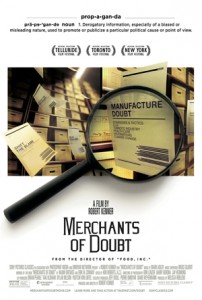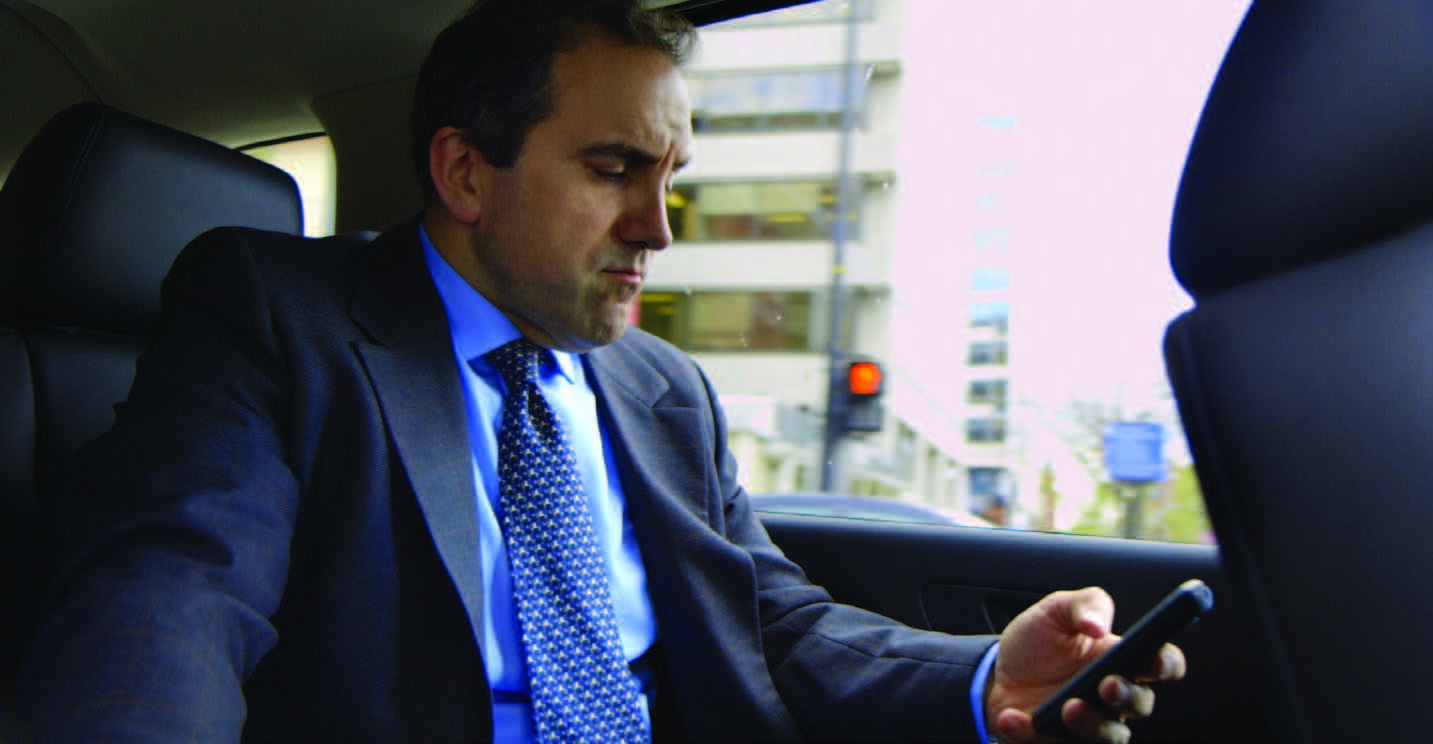Film Review: Merchants of Doubt

An outraged man goes to see his doctor. “Doc, you tell me I have a month to live, and now you send me a $600 bill? I can’t pay that!” The doctor scratches his chin and asks, “Well, how much can you pay this month?”
“A hundred bucks, tops.”
“All right, then, you have six months to live.”
That old Borscht Belt joke gets at something real: some experts are willing not only to sell their advice but to sell out their professions. No surprise there, perhaps, but the joke has one more barb: the patient won’t live to pay off his bill, so the grasping doctor’s attempt to get his fee is doomed. Why would an expert engage in self-defeating deception?
That is one of many mysteries the film Merchants of Doubt clears up. In the anti-spoiler spirit, I won’t tell you how. Even if you think you understand everything about climate science and its detractors, you must see this smartly crafted documentary. You have to see it, because only then will you truly understand how so many Americans can deny what they can readily see in their own backyards. Just as important, you’ll gain a fuller understanding of how a handful of truly accomplished scientists have dedicated themselves to a scientifically untenable proposition: that the 97 percent-plus consensus of climate scientists is wrong. Hint: it’s not about the money. Well…not all about the money, anyhow.
The climate is changing, and it has changed enough over the past three decades that the growing seasons in North America’s gardens, farms, and meadows have shifted north. Yet, when Senator Jim Inhofe (R-OK) tosses a snowball in the U.S. Senate, half of America guffaws. How can that be? More to the point, how can it be that just since 2008, the political weathervane of climate change has swung 180 degrees, such that leading Republicans who used to go on camera to state that climate change is real and requires action—Newt Gingrich and John McCain, to name a few—now mumble, “There’s no consensus”?
Merchants of Doubt shows us how. Indeed, one of the virtues of a film that necessarily consists largely of talk is that it also shows so well. The opening sequence sets out a visual leitmotif that recurs throughout the film with Wagnerian flair. The message: to sow doubt about climate change requires not only the science of marketing but also the art of the magician.
Director and cowriter Robert Kenner skillfully interweaves the story of Big Tobacco’s fifty-year campaign of deception with the ongoing drama of climate-change denial. The comparison makes it clear that, on the tobacco timeline, we’re stuck in the 1960s. All the scientific evidence that smoking kills was in back then, and the Surgeon General himself had declared it a public health menace, yet a highly effective PR campaign of doubt kept the public bamboozled.
The film clearly traces how Big Tobacco’s “playbook” developed into a series of campaigns for other industries that felt the need to stave off regulation to preserve profit—even if it killed their customers. Among these were asbestos, and the chemical and pharmaceutical sectors, but they were merely benchwarmers for the big boys: the fossil fuel companies.
Once the Koch brothers, the coal companies, Exxon Mobil, etc. saw climate change gaining political acceptance, they went to the playbook. While the tobacco companies had relied on a sole stepchild, the Tobacco Institute, the merchants of climate doubt created or infiltrated a squadron of think tanks. One of the remarkable achievements of the film is to take viewers inside these supposedly independent institutes and gain remarkably candid interviews. There’s a disillusioned former executive who quit when he learned that his organization was no more than a stooge for a certain well-known oil company.

Marc Morano: Executive director of ClimateDepot.com, a leading source for climate change skeptics. (Photo courtesy of Sony Pictures Classics)
Then there is the utterly shameless Marc Morano, a self-confessed poseur, political operative, and character assassin. “I’m not a scientist,” he tells the camera, “but I play one on TV.” Fans of the hit Netflix series House of Cards will recognize chilling similarities with the character played by Kevin Spacey, but Morano is for real, even if his credentials are not. He gleefully admits that he has no science on his side, let alone scientific training. His expertise is in humiliating scientists during “both sides” interviews on cable news programs, and then rallying his followers to deliver personal threats and abuse to his victims. The scientists have no chance. The film shows us several of them, and even the best communicators among them—people like Bill Nye the Science Guy—get clobbered, partly because they have the burden of explaining a complicated and inconvenient truth, while the doubt dealers feel free to make up anything that suits their case.
The film introduces us to a brave soul from the political world, Republican Congressman Bob Inglis of South Carolina, who, having seen the evidence, publicly embraces the reality of climate change. For his integrity, he gets pummeled in the next election, but Inglis emerges in the film as a calm, clear voice for sanity.
There is one missing dimension from Merchants of Doubt. When people engage in denial of the obvious, they often harbor a secret inkling of the truth. To maintain the denial, they need an offsetting belief. This takes us back to our lousy joke about the doctor: terminally ill patients nearly always react to their diagnosis with shock and denial. For most, depression follows.
Yet, multiple studies show that religious faith correlates negatively with depression for such patients. Of course, there are courageous exceptions like Carl Sagan, who calmly faced onrushing death with no expectation of an afterlife, but for most people religious faith appears to be an effective insulator against the unhappy fact of imminent death. (See, for example, Colleen S. McClain, Barry Rosenfeld, and William Breitbart, “Effect of spiritual well-being on end-of-life despair in terminally ill cancer patients,” The Lancet, May 10, 2003.)
The same emotional logic applies to climate change. In books, articles, and films, from An Inconvenient Truth through the one under discussion, it has been portrayed as a gathering global catastrophe.
Yet, it is important to recognize that for religious conservatives, the most natural response to being told that a human-caused catastrophe is imminent is to put one’s faith in God. I mean natural in several senses of the word.
First and most fundamental, “natural” as in instinctive: research suggests that conservatives on average react more fearfully to negative imagery. (See John R. Hibbing, Kevin B. Smith, and John R. Alford, “Differences in negativity bias underlie variations in political ideology,” Behavior and Brain Sciences, June 2014.) Present them with a scenario of doom, and you can confidently predict that many will react like terminally ill patients. That’s a problem for anyone who expects data to change minds. It comes across like, “All right, then, you have six months to live.”
Secondly, turning to God in the face of catastrophe is “natural” in the sense of “What else would you expect?” As the documentary makes clear, the PR campaign to sow climate change doubt has effectively—even scientifically—exploited a human vulnerability: the tendency toward tribalism. Once climate change became associated with Al Gore, it became all too easy to portray it as a cause of left-wing hippies, elitists, and crypto-communists. Michael Shermer, the libertarian founder of Skeptic magazine and a former climate skeptic himself, both explains and demonstrates this tendency to great effect in the film.
Third, “natural” in the sense of “the proper order of things.” This is the missing piece of the puzzle in Merchants of Doubt. While religion per se does not align with climate change denial, conservative American religious politics does. Right-wing ministers are potent merchants of certainty. The assurance they are marketing is this: no matter what the scientists discover, God will keep his flock from harm. They cite Bible passages to support contradictory claims: that God has promised to keep the Earth from harm forever, or that the End Times are upon us. Either way, what does it matter how much greenhouse gas we pump into the atmosphere? God’s got a plan.
Republican politicians, except the ill-fated Bob Inglis, are more than happy to parrot this kind of warped theology. At a 2009 House climate change hearing, Rep. John Shimkus of Illinois read Genesis 8:21-22 and Matthew 22:31 into the Congressional Record as “the infallible word of God.” Problem solved.
Most Americans are not theologians; they are, like all humans, partially rational, but mostly emotional social creatures. Merchants of Doubt performs a superb service in exposing the machinery that manipulates the emotions of the public—muddling their minds with contradictory claims, driving them toward tribal conformity, and keeping their outrage on the boil.
Perhaps it’s unfair to ask the documentary to do more, but viewers must keep in mind that the challenge of reconnecting scientific findings with public policy decisions is even more arduous than the film implies. Not only do we have to overcome a hydra-headed disinformation campaign, but we must find a way to disengage apocalyptic, tribalistic religion from politics.
A starting point for humanists may be to urge every minister and every member of Congress to watch the film for themselves.
